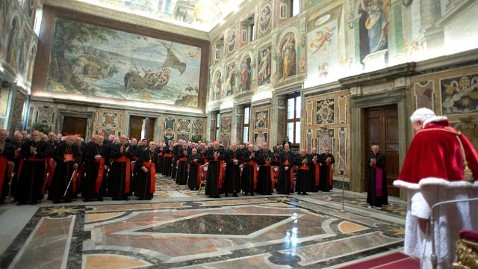Feb 28, 2013 9:34am

- (Image Credit: L’Osservatore Romano/Vatican/Getty Images)
ANALYSIS
VATICAN CITY – In a U.S presidential campaign, the New Hampshire primary is thought of as “retail politics,” where the candidates actually get to meet and have contact with real voters.
That’s Walmart, compared to a Vatican conclave. This process is more of a boutique.
READ MORE: Benedict XVI Begins Final Day as Pope
All the voters and all the viable candidates can fit into one room. In some cases, they have known each other – or known “of” each other – for years. In some cases, they have worked with (or against) each other in the daily management of the church.
It’s not just the fancy costumes, the churchly rituals or the sweep of history that makes this process so fascinating. There’s also the sheer human drama of it all.
VIDEO: Pope Benedict’s Last Sunday Prayer Service
For the 115 men planning to take part in the conclave to elect a pope, all of whom have devoted their lives to the Catholic church, this choice might well be the most important contribution they make. A lifetime of service reduced to a single election.
It’s also crucial for the world’s 1.2 billion Roman Catholics.
The new pope will set the tone of the institution on issues of life and death: abortion, birth control, genetic medicine, euthanasia and more.
He’ll frame the church’s role in the moral debate about the way people live their lives, as individuals and as families. Divorce, gay rights, adoption, education, the role of women (not least in the church) are all areas in which previous pope’s have exerted tremendous influence.
He’ll instantly be the most powerful spiritual leader in the world, a global ambassador for Christian values (however he and the rest of the church interpret that mandate).
9 Men Who Could Replace Pope Benedict XVI
Will he be able to win over a wayward flock? Many have left the church, bitterly disappointed by the betrayal of pedophile priests, the mismanagement of arrogant administrators or even what they perceive as the institution’s irrelevance in the modern era.
At its best, the church is a voice of compassion and social justice. But it has also, at times, been a voice of intolerance, as well as a bastion of the status quo.
On one level, this is local politics. Each voting cardinal – even the ones who live thousands of miles away – has a titular church, an actual church here in Rome assigned to them where they officially serve as the pastor. So the conclave represents the Roman clergy’s electing the next Bishop of Rome.
At another level, it’s global. Prelates from 50 countries do their best to discern (through the guidance of the Holy Spirit) how to make the universal church thrive in a new millennium.
Win or lose in a presidential election, we all know it’ll start all over again in four years’ time. There are checks and balances too, so, for better or worse, “change” tends to be largely a campaign slogan.
It would be sheer exaggeration to say any presidential contest were a battle for the soul of the United States.
But in a very real way that’s what this process is for the world’s largest church.
SHOWS: Good Morning America World News
Why Should We Care? The Politics of Picking a Pope
This article
Why Should We Care? The Politics of Picking a Pope
can be opened in url
http://newstetricous.blogspot.com/2013/02/why-should-we-care-politics-of-picking.html
Why Should We Care? The Politics of Picking a Pope










